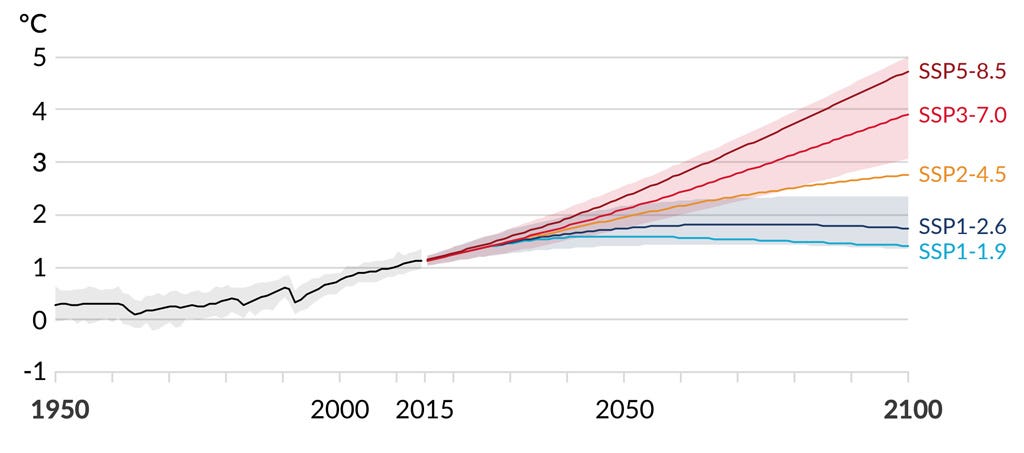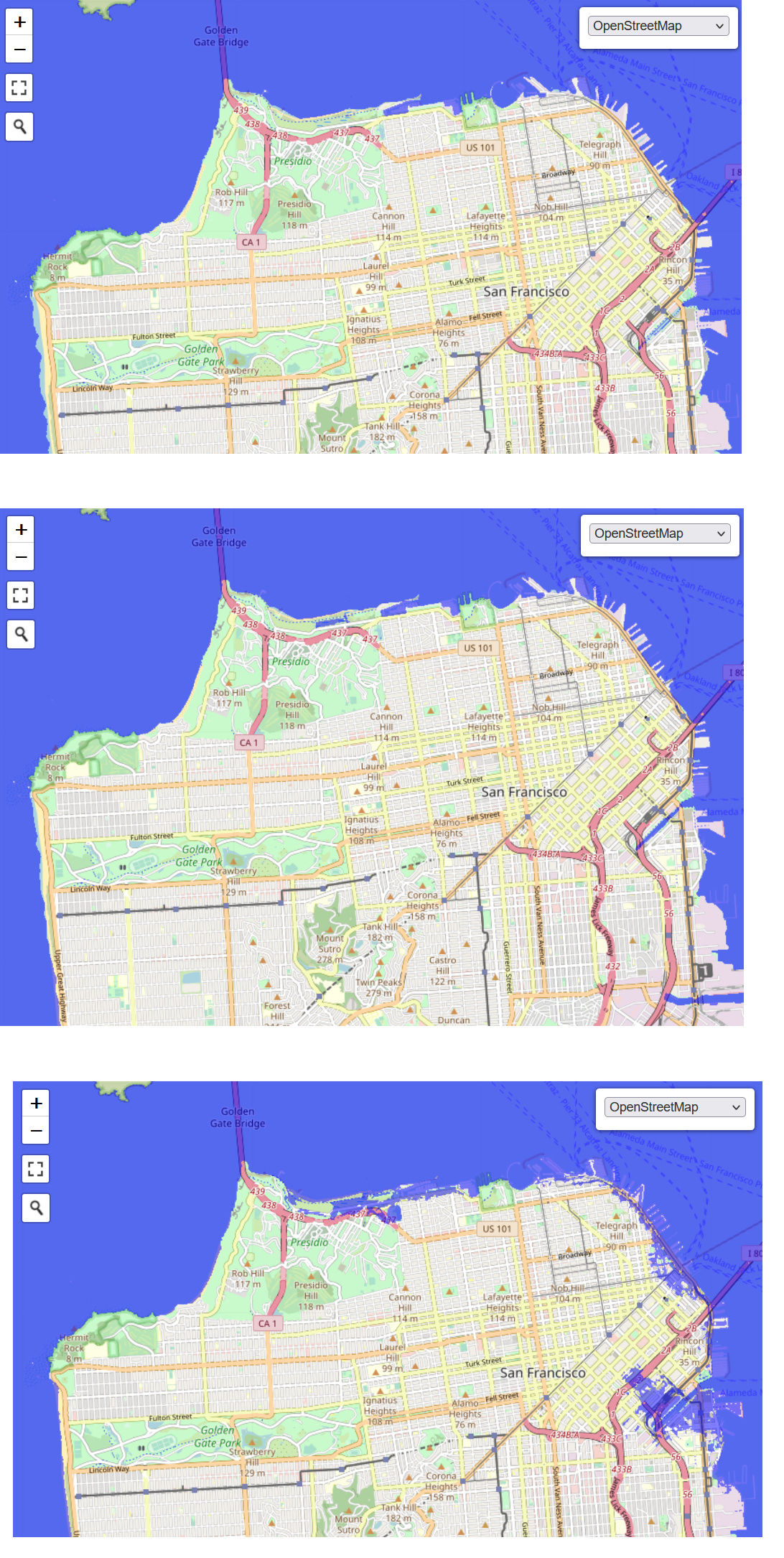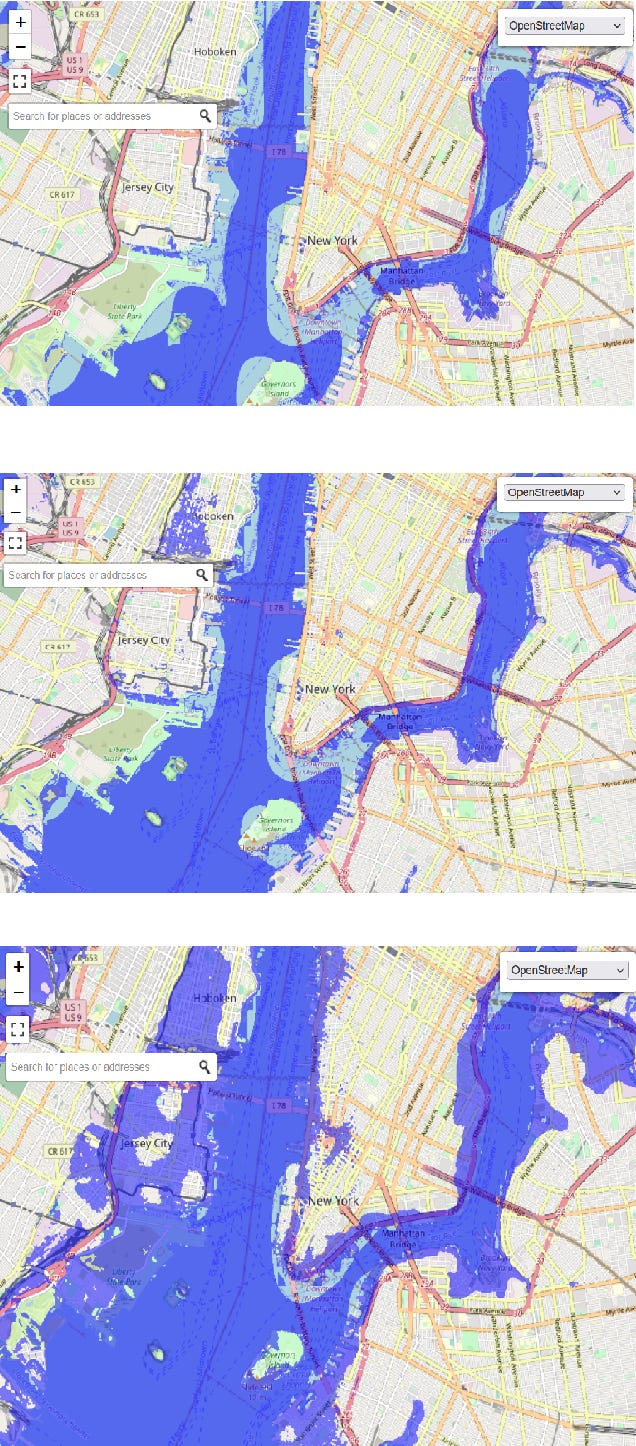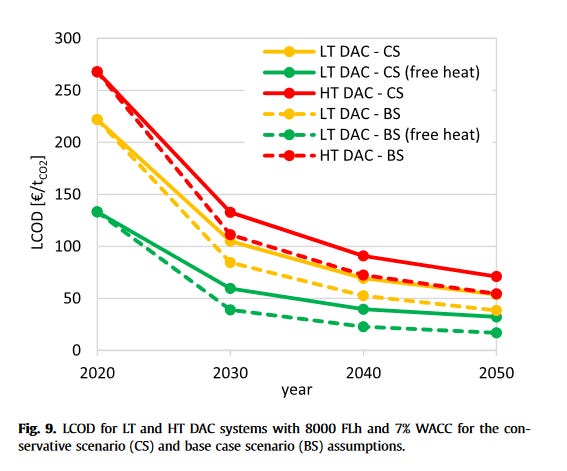Please Don't Give Up On Having Kids Because Of Climate Change
I.
A recent poll finds that 39% of young people “feel uncertain” about having children because of climate change. And sure, people say a lot of things on polls, but people seem to be talking about this more and more. For example, from NPR: Should We Be Having Kids In The Age Of Climate Change?
Standing before several dozen students in a college classroom, Travis Rieder tries to convince them not to have children. Or at least not too many. He’s at James Madison University in southwest Virginia to talk about a “small-family ethic” — to question the assumptions of a society that sees having children as good, throws parties for expecting parents, and in which parents then pressure their kids to “give them grandchildren.”
Why question such assumptions? The prospect of climate catastrophe. For years, people have lamented how bad things might get “for our grandchildren,” but Rieder tells the students that future isn’t so far off anymore.
Or, from CNBC, Climate Change Is Making People Think Twice About Having Children:
Analysts at Morgan Stanley said in a note to investors last month that the “movement to not have children owing to fears over climate change is growing and impacting fertility rates quicker than any preceding trend in the field of fertility decline.” Some people are choosing not to have children because they fear that that doing so will amplify global warming while others are concerned about extreme weather events their children may have to endure and the knock-on effects.
See also Guardian, BBC, NYT, etc, etc, etc.
The people profiled in these articles make two arguments. First, climate change will be so destructive that it would be wrong to bring children into such a bad world. Second, the more people there are, the more carbon they produce, so having more children will make climate change worse.
I disagree with both arguments. Starting with the first:
The current scientific consensus, as per leading scientific organizations like the United Nations’ Intergovernmental Panel on Climate Change, is that climate change will be very bad, but not world-endingly bad.
Climate change will cause worse hurricanes, fires, and other disasters. It will lead to increased spread of invasive species and diseases. It will hit subsistence farmers in poor agricultural countries very hard, and some of them will starve or become refugees. But it won’t cause the collapse of civilization. It won’t kill everyone. Life in the First World will continue, with worse weather and maybe a weaker economy, but more or less the same as always. The people who say otherwise are going against the majority of climatologists, climate models, and international bodies.
One way to think of this is to notice that we’ve already gotten about 25-30% of the global warming we’re likely to see by 2100.
 (source)
(source)
This has already been pretty bad, with unusually many hurricanes, wildfires, and droughts. It’s hard to tell how many people have died of climate-change-related causes. Maybe thousands? Maybe tens of thousands? Probably trillions of dollars have already been lost to disasters and agricultural problems. But tens of thousands of deaths and trillions of dollars lost is completely compatible with the average person in the First World not really noticing much of a change to their daily lives. The next 75 years of global warming are going to be worse than we’ve gotten already, maybe millions of lives lost and tens of trillions of dollars in damage. In aggregate, they’re going to be a giant disaster. But the average person in the First World, probably including your child, still won’t notice much of a change to their daily lives.
I want to focus on sea level rise because it’s easy to quantify and display. Sea levels have already risen about a quarter of a meter since 1880. This has flooded some low-lying islands, damaged some coastal cities, and devastated some wetlands and other habitats. But the average person in the First World hasn’t noticed. The IPCC predicts sea levels will probably rise another half a meter to a meter by 2100, so maybe 2-4x as much as they’ve risen already. This also won’t be very noticeable to average people. Here’s San Francisco now (top picture), after 1m of sea level rise ie the IPCC’s worst-case scenario for 2100 (middle picture) and after 3m of sea level rise ie the worst-case scenario for 2200 (bottom picture):
 (source: FloodMap.com)
(source: FloodMap.com)
Here’s the same analysis for NYC:
 Realistically people will build floodwalls or try to fight this some other way so it probably won’t get this bad, so think of this more as a worst-case scenario.
Realistically people will build floodwalls or try to fight this some other way so it probably won’t get this bad, so think of this more as a worst-case scenario.
I don’t want to trivialize this. In the pictures, about 1% of SF and 10% of Manhattan are gone by 2200. Lots of people would lose their homes, and lots of businesses would lose multi-billion-dollar skyscrapers. But none of this is happening by 2100 (ie during your kids’ lifetimes), and no serious expert endorses those pictures where the Statue Of Liberty is underwater up to the shoulders or anything like that. Again, this is going to really suck for a lot of wetlands and beaches and people with houses in those places, but the average person in the First World isn’t necessarily even going to notice.
(exception: Miami, New Orleans, Venice, and a handful of other extremely low-lying cities could sink before 2100 unless strong measures are taken. If you live there, you should be extremely worried - but instead of giving up on having kids, consider moving somewhere else.)
What about problems other than sea level rise? One way of looking at this is to think of how much slack there is in First World systems. For example, California has had lots of droughts recently, and probably this is related to climate change. Probably those droughts will get worse in the future, and it’s easy to imagine parched Californians begging for water.
But so far, the droughts haven’t been bad enough that California stopped golf courses from watering their massive lawns to keep them perfectly green every day. But if anyone was actually dying of thirst, or even having enough trouble getting water that they might be motivated to vote out some politician over it, the government could redirect the golf course water, or any of a thousand other things like this, and everyone would have more than enough. You see this everywhere - lots of resources are being wasted for stupid political reasons. If the political calculus ever changed - as it will, if these problems ever start inconveniencing privileged First World citizens - then we can stop wasting the resources, and use them to address the symptoms of climate change instead.
Am I sure that things will work out like this, rather than end up in some runaway loop where the planet turns into Venus? Not totally sure. The scientific consensus says it’s very unlikely that will happen - according to the IPCC, “a ‘runaway greenhouse effect’—analogous to [that of] Venus—appears to have virtually no chance of being induced by anthropogenic activities.” Still, let’s say there’s still a 1% chance that everyone’s wrong and this can happen. Is it fair to bring children into a world with a 1% chance of getting destroyed?
I can’t answer this question, but I would remind you that your parents faced the same question. Ever since World War II, the world’s been at risk of destruction from nuclear Armageddon - at some points probably a lot higher than 1% risk - and your parents chose to have you anyway. I am grateful for my parents’ decisions here and so I conclude that having children in a world with a 1% risk of apocalypse is fine.
I think this point is true more generally. Most of the people profiled in the articles above are well-off, educated Americans. I think it’s important to remember that well-off, educated Americans are in the top 1% of people today in terms of how good their children’s lives are likely to be, and probably in the top 0.1% throughout history. Five hundred years ago, an average child had about a 40% chance of dying of some terrible disease before they were five years old. If they survived, they would be chattel property of some lord who would make them do backbreaking farm labor their entire lives without any hope of earning more than subsistence wages. If female, she could be married off against her will to some random man 10-20 years older than she was, with the legal right to rape her as much as he wanted. If male, he might be drafted to serve as a literal pawn in some border war, and die of dysentery on the way to being bayonetted by some enemy. If gay, they could be burned alive; if black, enslaved; if poor, left to starve. Much of the world is still pretty similar to this! Meanwhile, your child is likely to live in a stable home, get spoiled and bought a thousand different kinds of toys, go to a good college, and make well above median US income. Even quite a lot of global warming-related suffering doesn’t take them out of the luckiest 1% of people in history.
If you think privileged modern Americans shouldn’t have children now because of quality-of-life issues, you implicitly believe that nobody in the Third World, or nobody before 1900, should ever have had children. This isn’t necessarily wrong. There’s a group of philosophers called “antinatalists” who believe nobody should ever have kids because life is suffering. These people are at least consistent. If you’re not one of them, I think the quality-of-life argument for not having kids now is pretty weak.
II.
The other argument is the moral one. Yes, climate change will probably mostly affect poor subsistence farmers - so not your own children. But isn’t it still immoral to have children, knowing that they’re making the problem worse for others?
I think no. How many people are you expecting to not have children because of global warming? 1%? 2%? 1-2% of people changing their individual decisions will do basically nothing. What we actually need is concerted government action.
But your choice not to have children makes that government action less likely to happen. Suppose 1-2% of Democrats stop having children because they’re worried about climate change. Meanwhile, Republicans don’t care about this and have just as many children as ever. Since children tend to share their parents’ political beliefs, this skews elections in favor of the Republicans, who will prevent strong government action.
(sorry for being so America-centric here - other people can figure out how this applies to their own countries)
I did an analysis to try to figure out how much this matters, and I predict that if 5% of people in the last generation had avoided having children because of climate change, that would have been enough to switch the outcome of the 2020 presidential election from Biden to Trump. Remember, most presidential elections are very close. So even though 5% fewer kids will only decrease carbon emissions by 1-2%, it will decrease Democrats’ chance of winning elections by a lot more.
This matters even if you’re not in a swing state. Washington isn’t a swing state, but a first-in-the-nation carbon tax that could have encouraged other places to follow suit failed 60-40 there. There are constant state primaries between senators, representatives, and governors with different levels of climate urgency.
(some people have argued these calculations are meaningless because of the median voter theorem. I don’t know how to adjust the median voter theorem for the large differences in existing US parties and the electoral college, so I admit I haven’t factored it in here)
It feels kind of mercenary to say you should let your decision about having kids hinge on how it affects national politics. Normally I wouldn’t recommend it. But if you’re already going to let your decision hinge on how it affects climate change, it does seem relevant that (through national politics) it would probably make climate change worse instead of better.
For any percent of people not having children because of climate change, this affects the climate some linear amount, and the political calculus some much larger amount (because it affects a razor-thin majority). But this is just the most quantifiable part of a more general argument. The future is going to need more climate scientists, climate activists, renewable energy engineers, and climate-friendly politicians. Not all of those people are going to come from families that care a lot about climate change. Some of them will be born to climate deniers and change their minds. But that’s an uphill battle, and it’s the people who care a lot about climate change who have the best chance of raising those people. If you take the few percent of people most committed to stopping climate change, and remove them from the next generation, that doesn’t look good for the next generation.
III.
Finally, I want to respond to the news articles that say having a kid will create 60 tons of carbon a year and be a disaster for the planet. You can find these at The Guardian, Yale, Euro News, etc.
I think most people would be surprised by the methodology of the study involved. It assumed that you would have a child, that child would have children of their own, those children would have children, et cetera. Each of those children would produce carbon, meaning that in theory your decision to have a kid could produce infinite carbon. But then they assumed that due to declining reproduction rates, maybe the chain of having kids would end at some future point, producing a very large but finite amount of carbon. Then they divided all these generations of future carbon production by the number of years you personally would live, and said it would produce 60 tons of carbon per year.
There’s a lot wrong with this study. For one thing, almost nobody who reads it realizes that this is about the amount of carbon produced by a vast clan of descendants, and that an actual kid produces more like 1 ton of carbon yearly while they’re still living at home. For another thing, it assumes people in the future will produce exactly as much carbon as we do, which is almost certainly false - carbon emissions per person have been decreasing rapidly since 2000, and are on track to decrease more. Finally, it covertly assumes that global warming won’t cause too many problems - if it leads to disaster in 2050, your kid won’t be having a giant clan of descendants who keep on producing 2010s-levels of carbon all the way to 2100 and beyond.
Even the scientist who wrote this study said in an interview that she still believes people should have kids if they want to:
SS [interviewer]: What I think is really interesting is that despite you and your colleague being the ones who ran this study that produced this finding, you still say that people should totally have kids if they really want to be parents. So how do you square that circle?
KN [scientist]: One thing it’s really important to realize is that population is actually irrelevant to solving the climate crisis. And the reason for that is that we only have the next few years to solve the climate crisis reasonably well.
We know that we have this limited carbon budget that determines how much warming we’re going to experience. We’re really close to scary and dangerous limits right now. And we know what we have to do, which is leave fossil fuels in the ground and switch to regenerative and sustainable agriculture. That’s what our job is basically in this next decade.
So in that sense, creating new people? Well, yes, of course, it is true that more people will consume more resources and cause more greenhouse gas emissions. But that’s not really the relevant timeframe for actually stabilizing the climate, given that we have this decade to cut emissions in half.
Another interesting way to look at this is: how much money would it take to offset the carbon cost of your future child? That is, you can build machines that suck carbon out of the air - how much would it cost to use these machines to suck up exactly as much carbon as your future child will emit over their lifetime?
The average child emits about 1 ton of carbon per year during childhood. The average adult emits about 15 tons of carbon during adulthood. But if emissions decline at the same rate they’ve been declining recently, by the time your child is in their 20s that’ll be down to 7.5 tons. Also, location matters - the people of Wyoming emit 100 tons each, and the people in DC only 4 tons each (rural lifestyles require more carbon than urban ones). I’m going to predict your future child is more likely to live in a city than in Wyoming, and round off their adult carbon output at 5 tons/year. Suppose your child lives for 90 years - 20 years at home, 70 as an adult. Then their total lifetime carbon emission is 201 + 705 = 370 tons.
Right now the people with giant carbon-sucking machines charge $1000/ton to remove carbon. There are prototype machines already working that can do it for $500, so that price point should be available shortly. There seems to be a Moore’s Law for this kind of thing, and when people calculate it out it looks like it’s going to get cheaper pretty quickly:
 (source)
(source)
So by the time your child is an adult, carbon removal will probably cost about $50/ton.
So 20 tons of near-term carbon offset at $500/ton, plus 350 tons of long-term carbon offset at $50/ton = $10000 + $17500. Round up for uncertainty, and my guess is you can offset your child’s lifetime carbon emissions for about $30,000.
This is a lot of money, but most of the people considering not having children for climate reasons are pretty well-off. Most privileged parents are already resigned to having to pay $100,000 - $200,000 to get their kid into the best college; surely they should also be willing to pay $30,000 to let their kid exist at all.
But also - how little confidence in your own parenting skills do you have to have, to believe that your child will add less than $30,000 in value to the world? Even if you’re not an Ivy Leaguer and you don’t have that kind of money, if you want kids at all you have to believe they’re going to add something to the world, right? Maybe it’ll be as a climate change activist or environmental scientist, maybe it will be in some totally different field, but if you don’t think your kid is going to make the world a better place in some way, why bother?
I realize this is not really as sober an argument as some of the others, but those others were my attempts to make sober arguments. This is the one I actually believe.
In conclusion, climate change will probably be very bad for the world, but not in a way that will have catastrophic effects on your child in particular. Cancelling plans to have kids because of climate change will decrease emissions a very limited amount, while having a disproportionately large effect on the government’s ability to pass climate change related legislation. A less destructive way of assuaging your guilt over having children would be to donate some money to climate charities or carbon offsets in your kid’s name. Nobody who really wants a kid should avoid having one because of climate-related concerns.